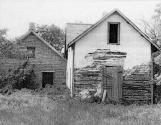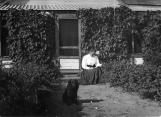1
The Humboldt Telegraph Station story includes the facinating lives of Alfred and Margaret von Lindeburgh.3
In the year 1880 Alfred was appointed assistant telegraph operator and meteorologist director at Humboldt, District of Assiniboia, N.W.T. Here he met Miss Margaret Liggett, who later became his wife. She was residing with her sister and brother-in-law, Catherine and George Weldon.Alfred von Lindeburgh was born of Swedish parentage in Council Bluffs, Iowa, U.S.A. on September 17, 1845. The family returned to Sweden where Alfred finished his education at the University of Lunn. Owing to Alfred's linguistic education, he became an interpreter on the Allan Line of Ships, carrying immigrants from Liverpool, England to Quebec, Canada.
5
In 1883 the Telegraph Office at Humboldt was closed and Alfred von Lindeburgh was instructed to locate a new station some 90 miles eastward. This he did and, when he had gone about the required distance, he came upon a small clearing of open land. Here he decided to build a house and set up his telegraph equipment in a room therein. He named it "Kutawa" which is a Cree word meaning a "gap" or "clearing". This gap was on the N.W. 1/4 10-28-16-W2nd. The two-storied, ten-roomed home, built of logs, lathed and plastered on the inside with clapboard on the outside, on a solid stone foundation, soon became the home of Maggie Liggett. On April 15, 1884, she became the bride of Alfred von Lindeburgh at Grenfell and moved to the telegraph home at Kutawa.Alfred died in 1930, when he suffered a stroke and passed away a week later.
7
With George and Catherine Weldon, at the Humboldt Telegraph Station, was Catherine's sister, Margaret.Margaret Liggett, known as Maggie to the family of five brothers and three sisters, was born April 15, 1858 at Fintona County, Tyrone, in Northern Ireland. Her father was a farmer and their farm, "Altanarva", was situated three miles south of Fintona. Her mother died when Maggie was only four and her father, in 1869, when she was only 11. In 1876 Maggie's sister Kate moved to Darlington, Ontario to be married to George Weldon. It is not known when Maggie followed to reside with them, but she was definitely there when they made their long trek west from Ontario to Humboldt.
Taken from an article in "Rod and Gun", printed probably in the late 1800's.
...Miss Margaret Liggett, now Mrs. Lindeburgh of Touchwood Hills, Assiniboia was a bright, vivacious Irish girl from Altanarva, County Tyrone, and came to Canada in 1876. She was the guest of her sister, Mrs. George Weldon, at Humboldt, N.W.T. In those days Humboldt was "a hundred miles from nowhere", and consisted of a solitary house. One can scarcely imagine the amazement of a light-hearted Irish girl, fresh from home and kin, sent down to this wilderness of the West. She found everything novel - the silence of the plains, the absolute inertia of prairie life, the long uneventful days, and the solemn stillness of the starry night - no companionship save that of her sister, her sister's husband, and "Birdie", the baby of the happy little prairie home. The sight of a traveler was unusual at Humboldt, except the annual visit of the Telegraph Inspector, a blanketed Indian Chief, an occasional line of freight cars in the distance, and the arrival of the mail once in five months. Miss Liggett's interest in wildlife was awakened. She saw her brother-in-law bring down a partridge or overtake a slinking fox, and each day she found that life itself depended upon the quick touch of the trigger, and quite as an amusement she learned to take aim, fire, and load again. Within a season she became an expert at target practice, and by her newly acquired skill she once saved her own life. It was her first "game".
One fine afternoon, lured by the limpid light that fell athwart a prairie sky, she wandered away further than she knew. Tripping through the bosky fields, unfenced, unhedged, and far reaching, she suddenly found herself confronted with a wolverine, one of the most vicious animals of the western prairies. Between the girl and safety an appalling distance yawned, and the glare of two hungry eyes eager-for-blood were before her. Down came the rifle from a careless shoulder, and up went the shining barrel. A quick Irish brown eye, all undaunted, looked along the "sight", while a firm white finger touched the trigger. As the wolfish teeth snapped, the animal crouched to leap for blood, but it was to receive the lead pellet straight in the middle of its forehead. Then the woman overcame the huntress, and seeing the creature dead before her, the plucky girl turned and fled, pursued by the terrible thought of a life taken. Later on she learned to rejoice over such a splendid field prize.
Miss Liggett's skill with the rifle was remarkable. She shot all kinds of wild game, and the Weldon table had every delicacy known to the middle west. Trophies adorned the walls of the neat log house at Humboldt, and many beautiful and costly rugs were the proof of her excellent marksmanship.
When the Marquis of Lorne, then Governor-General, made his journey over the land in 1881 the London Graphic recorded this note of his meeting with Margaret Liggett:
"We found two ladies in the bigger house, the wife and sister of the Government Telegrapher - himself absent on duty. They both complained, not unnaturally, that Humboldt was 'a little lonely'. But she is a lively, pretty Irish girl who has a right to feel aggrieved that her good looks and fun are wasted on such desert air. For want of better sport she has taken 'gunning' - has a gun of her own and is a capital shot, has even slain a wolverine."
Many a sojourner passing over the Humboldt trail, grass - grown and scarce touched by traffic, will still remember the bright-faced girl whose merry laugh broke the dull days of long ago. The "crack" of a rifle when fired by her "bespoke a good duck dinner, too!" Who that has "gone north", mosquito harried and wind beaten, has not gratefully remembered the open door of Weldon's home in the solitude of hemlock and popular fastnesses?
9
All that has passed away, and Humboldt is now a "town" of pretensions. Pretty Margaret Liggett sits a glad-faced matron, no longer lonely, surrounded by her boys and girls today, but at the pretty Touchwood home there hangs on the wall a well-worn rifle - the one that brought down many a game bird and field beast in the early days at Humboldt.Maggie was a proficient telegraph operator and was appointed assistant operator shortly after coming to Kutawa, where she moved with her husband, Alfred von Lindeburgh. Margaret passed away in 1912 from cancer.



